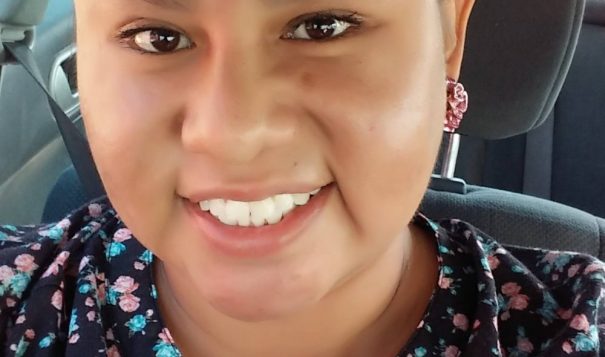 Sheena Between Lodges is seen in a photo shared on social media. The 32-year-old Lakota woman was brutally beaten in South Dakota and is fighting for her life.
Sheena Between Lodges is seen in a photo shared on social media. The 32-year-old Lakota woman was brutally beaten in South Dakota and is fighting for her life.
A 32-year-old Lakota woman is fighting for her life after being severely beaten earlier this week and suffering a traumatic brain injury.
Sheena Between Lodges is currently showing no brain activity, said her niece, Krystal Two Bulls.
“The prognosis is not good,” Two Bulls said from Regional Health Rapid City Hospital, in Rapid City, South Dakota, where Between Lodges is being treated. “Neurologically, she’s not responding.”
Robert Ecoffey, the chief of police for the Oglala Sioux Tribe, said Thursday that his department is investigating Between Lodges’ injuries.
“I really can’t give any details, just that the matter is under investigation by our department and by the federal authorities, BIA Office of Justice Services and the FBI,” he told Indianz.Com.
https://www.facebook.com/THEOGLALANATION/videos/752157635137919/
The Oglala Sioux Tribe’s newly elected president, Julian Bear Runner, posted a statement about Between Lodgeson Thursday night.
“I am deeply hurt by the recent horrific beating and hiding of an Oglala woman, Sheena Between Lodges,” he wrote. “I am calling for her assailant(s) to be brought to swift justice, their apprehension and arrest is required immediately to ensure public safety. In the wake of increasing missing and murdered indigenous women awareness, it is a serious threat to our wellbeing that my administration will deal with.”
Two Bulls said her family was told that Between Lodges – the mother of two young daughters – was injured Sunday night and was allowed to lay unconscious somewhere in Pine Ridge, South Dakota, for nearly three days until someone finally called for help.
On Wednesday afternoon, community members held a gathering in Pine Ridge to ask for prayers and seek justice for Between Lodges.
Two Bulls, who lives in Montana, said her aunt had suffered abuse in the past and had often called her friends and family seeking help. However, Between Lodges refused to report her abuser to authorities, she said.
She said her family struggled to get authorities to investigate her aunt’s most recent injuries initially.
“It was all a really slow process to actually get people to take it serious and to actually go out and do that,” Two Bulls said.
She said her family wants to share Between Lodges’ story in the hopes that it might generate a discussion about the abuse of Native women. It is a conversation that already is taking place.
The election of the country’s first two Native women to Congress on Tuesday is promising to shed more light on the plight of missing and murdered indigenous women. In New Mexico, Deb Haaland won in the 1st Congressional District, and in Kansas, Sharice Davids won the 3rd Congressional District seat.
On Thursday, Haaland told Democracy Now! that she plans to bring the issue of missing and murdered indigenous women to the forefront on Capitol Hill. “You know, that is an epidemic,” she said on the program.
“That’s something that we need to work on,” Haaland said. “I’ll go to Congress to make sure that we are paying attention to the issues that folks care about.”
Already, a bill before the Senate known as Savanna’s Act, named for Savanna Marie Greywind, a young citizen of the Spirit Lake Nation who was brutally murdered last year, would require the Department of Justice to report, every year, on the “known statistics on missing and murdered Indian women in the United States.”
The Senate Committee on Indian Affairs took testimony on S.1942 on October 25, 2017, but it has not yet been scheduled for a business meeting, the next step in the legislative process before it can be considered by the full Senate.
H.R.6545, the Violence Against Women Reauthorization Act of 2018, also includes provisions to address the crisis. The bill has not seen any movement in the House. No Republicans have signed onto it either.
Democrats gained enough seats to take control of the chamber but they won’t be in charge until the 116th Congress convenes in January 2019.
And leaders from two states, Nebraska and Washington, have taken steps to begin tracking cases of missing Native women.
Two Bulls, who is the founder and director of Voices of the Sacred, a youth empowerment organization, said her family hopes Between Lodges won’t become just another statistic.
“I’ve been in an abusive relationship,” she said. “The majority of the women in my family have all been exposed to violence and domestic abuse, and that’s not okay. That’s a systemic thing and that has roots in colonization.”
She said she hopes her aunt’s story will inspire a broader discussion about restorative justice and a deep examination of the most effective means for addressing domestic abuse. Those who commit domestic abuse often suffered trauma in their own lives, and in order to halt the cycle of violence, people need to start considering ways of treating the abuser as well as the victim, Two Bulls said.
“We think that it’s really important for people to start acknowledging that this exists within our families, within our communities, within our tribes, and the fact is that violence has been normalized within our communities,” she said.
And she wants people to know that even though her aunt struggled with alcohol and abuse, she didn’t deserve the pain and injuries she suffered.
“She was a good friend. She was a good relative,” Two Bulls said. “She was a good mom. That’s all she wanted. She just wanted to find happiness and to be a good mom and to be in a healthy relationship.”
